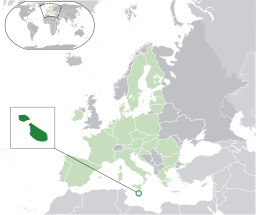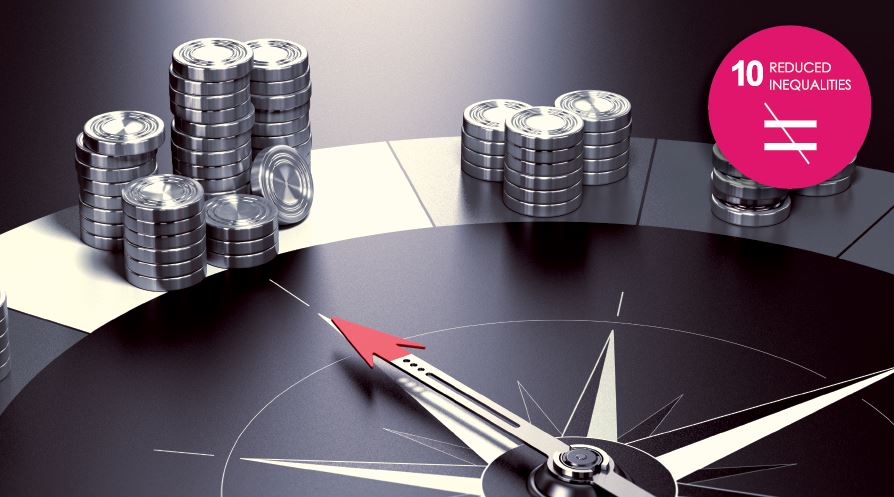[vc_row][vc_column width=”1/2″][vc_column_text]
Malta
The light green area is the rest of the European Union
Malta was the 122nd largest economy in the world by nominal GDP in 2018. GDP per capita is $30,075 USD. It is a small island country strategically located in the Mediterranean Sea at a crossroads between Europe, North Africa and the Middle East. It has few natural resources and relies heavily on trade, particularly with Europe. Trade was at 268 percent of GDP in 2018. It is ranked 39th in the World Bank's Human Capital Index. It has been a member of the EU since 2004. Services was the largest economic sector in 2018 (75 percent of GDP), followed by manufacturing (8.8 percent), and agriculture (0.91 percent). In 2017, the largest export sectors were services (76.7 percent), electronics (7.5 percent), and minerals (5.2 percent). The largest individual exports were ICT services (43 percent), insurance and finance (18.7 percent), travel and tourism (9.7 percent), transport (5.6 percent), and electronic integrated circuits (5 percent). Its largest export partners were Italy (12 percent), Singapore (10.3 percent), China (9.3 percent), and Germany (9 percent). The largest goods imports were refined petroleum (28 percent), and cargo ships and similar vessels (21 percent). Malta became a British protectorate in 1814 and eventually became the base of the British Mediterranean fleet. Its strategic importance increased with the opening of the Suez Canal in 1869. By 1900, the economy was heavily dependent on British defence expenditure. After independence in 1964 and the departure of British bases, the government turned to an export led and FDI growth model. The manufacturing sector was developed, starting with labour intensive industries such as textiles before moving to more advanced manufacturing from the 1980s. Tourism was also developed, and financial services following deregulation and privatisations starting in the 1980s. The importance of services only increased after Malta joined the EU in 2004. The global financial crisis hit tourism and manufacturing leading to a recession but public debt was relatively low and the economy proved resilient. Post crisis, the economy recovered strongly with among the highest growth rates in Europe. Malta is also a leader in the development of blockchain and cryptocurrency services.
[/vc_column_text][vc_column_text] Its population in 2018 was 432,089 [1]
Its population in 2018 was 432,089 [1]
 In 2015, 5.36% of its total energy
In 2015, 5.36% of its total energy
consumption was renewable [2]
 In 2021, its GDP grew by 9.41% [2]
In 2021, its GDP grew by 9.41% [2]
 In 2021 it had a negative Current
In 2021 it had a negative Current
Account Balance of US$bn 0.88 [3]
 Its unemployment rate in 2021 was 3.55% [3]
Its unemployment rate in 2021 was 3.55% [3]
 Its Expenditure on R&D (as a percentage of
Its Expenditure on R&D (as a percentage of
GDP) in 2020 was 0.68% [2]
What free trade areas or economic unions is it a member of?
Member of the European Union (EU) since 01/05/2004
Other members:
Austria, Belgium, Bulgaria, Croatia, Cyprus, Czechia, Denmark, Estonia, Finland, France, Germany, Greece, Hungary, Ireland, Italy, Latvia, Lithuania, Luxembourg, Netherlands, Poland, Portugal, Romania, Slovakia, Slovenia, Spain, Sweden
What trade deals are there between European Union and other countries and economic unions?
EU - Andorra Customs Union (from 01/01/1991)
European Single Market (SM) (from 01/01/1993)
EU - Sri-Lanka Co-operation and Partnership Agreement (from 01/04/1995)
EU - Türkiye Customs Union (from 31/12/1995)
EU - Faroe Islands Agreement (from 01/01/1997)
EU - Palestinian Authority Interim Association Agreement (from 01/07/1997)
EU - Tunisia Association Agreement (from 01/03/1998)
EU - Armenia Partnership and Cooperation Agreement (from 09/09/1999)
EU - Morocco Association Agreement (from 01/03/2000)
EU - Israel Association Agreement (from 01/06/2000)
EU - Mexico Global Agreement (from 01/10/2000)
EU - San Marino Customs Union (from 01/04/2002)
EU - Jordan Association Agreement (from 01/05/2002)
EU - North Macedonia Stabilisation and Association Agreement (from 01/04/2004)
EU - Pakistan Co-operation agreement (from 29/04/2004)
EU - Egypt Association Agreement (from 01/06/2004)
EU - Chile Association Agreement and Additional Protocol (from 01/03/2005)
EU - Algeria Association Agreement (from 01/09/2005)
EU - Lebanon Association Agreement (from 01/04/2006)
EU - Albania Stabilisation and Association Agreement (from 01/04/2009)
EU - Pacific States Interim EPA (from 20/12/2009)
EU - Montenegro Stabilisation and Association Agreement (from 01/05/2010)
EU - Central America Association Agreement (from 01/08/2013)
EU - Serbia Stabilisation and Association Agreement (from 01/09/2013)
EU - Bosnia and Herzegovina Stabilisation and Association Agreement (from 01/06/2015)
EU - South Korea Free Trade Agreement (from 01/07/2015)
EU - Kosovo Stabilisation and Association Agreement (from 01/04/2016)
EU - Georgia Association Agreement (from 01/07/2016)
EU - Moldova Association Agreement (from 01/07/2016)
EU - Canada Comprehensive Economic and Trade Agreement (CETA) (from 21/09/2017)
EU - Eswatini (SADC) Economic Partnership Agreement (from 05/02/2018)
EU - Lesotho (SADC) Economic Partnership Agreement (from 05/02/2018)
EU - Mozambique (SADC) Economic Partnership Agreement (from 05/02/2018)
EU - Namibia (SADC) Economic Partnership Agreement (from 05/02/2018)
EU - South Africa Economic Partnership Agreement (from 05/02/2018)
EU - Botswana (SADC) Economic Partnership Agreement (from 05/02/2018)
EU - Japan Economic Partnership Agreement (from 01/02/2019)
EU - Eastern and Southern Africa States free trade agreement (from 07/02/2019)
UK - EU Trade Deal (from 01/01/2021)
[/vc_column_text][vc_column_text]What trade deals are there with other countries and economic unions?
None
[/vc_column_text][/vc_column][vc_column width=”1/2″][vc_column_text]AUM Asset Management Ltd.: ESG Investing from the Bottom Up & Top Down – Setting a New Standard
‘ESG Principles Inform Everything We Do,’ says Founder of AUM Asset Management Ltd. Jean-François de Clermont-Tonnerre
Pragmatic Play: The Name Itself Reveals Philosophy of iGaming’s Champion
Wealth on the Move: HNWIs Continually Searching for their Own Little Piece of Paradise
How Bingo Came in From The Cold
Gabriel Chaleplis Leads the Way Into the Intelligent Future of Betting and Gaming
Making Every Drop Count: Reducing Water Loss in the Middle East and North Africa Region
Trade with the United Kingdom
Source: UK Office for National Statistics, October 2022.
Contains public sector information licensed under the Open Government Licence v3.0.
Loading, Please Wait!
This may take a second or two.





















































































